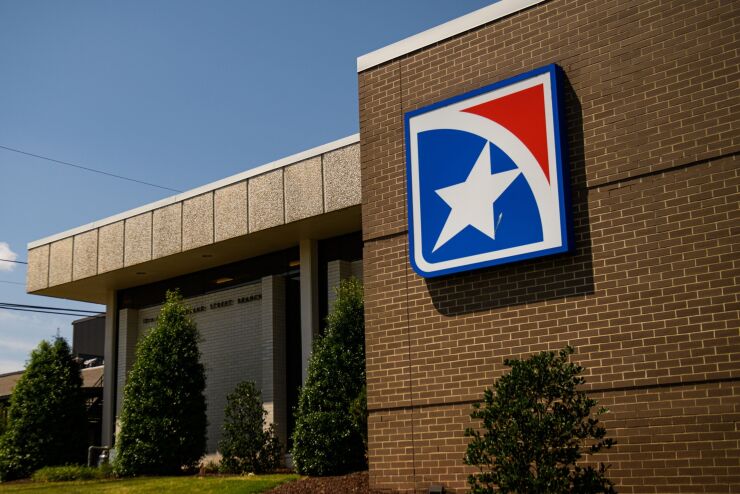
Last year didn't go as planned for First Horizon Corp., the Memphis, Tennessee-based regional bank that was due to be bought by TD Bank Group.
But, forced to continue operating on its own, the bank is finding momentum. It
Investors aren't convinced yet that the $81.7-billion asset bank's shares are worth diving back into — its stock price is down 42% from this time a year ago. While First Horizon's quarterly earnings report last week showed clear signs of progress, analysts said the company will need more such quarters to show the momentum is real.
"There's a little bit of a wait-and-see mentality," said Chris Marinac, an analyst at Janney Montgomery Scott, who has a neutral rating on the stock.
One path forward for First Horizon remains, of course, another attempt at a merger. There's "real value" in the bank's franchise, Marinac said, pointing to a dependable base of depositors in Tennessee and elsewhere. Loyal customers in its high-growth Southeast markets should be attractive to a would-be buyer.
The problem is that bank acquisitions have stalled. High interest rates are
So for now, First Horizon will "tread water" and stay focused on "building out the power of this franchise," CEO Bryan Jordan said in a recent interview. Those efforts include ensuring that the bank can continue capitalizing on its

"M&A will take care of itself down the road, but right now we're focused internally on growing this business," Jordan said. He added that he would "never say never" on a future deal.
Operating First Horizon as a standalone bank isn't cheap. One key benefit of mergers is that a larger company has more money to invest in the types of technology that give customers a modern banking experience.
If the TD deal had gone through, First Horizon wouldn't have to undertake some of that spending. After all, the Toronto-based bank's U.S. division, TD Bank, is more than four times larger than First Horizon and has plenty of firepower for tech investments.
So for now, First Horizon is catching up on tech spending. The bank said last week that it expects its non-interest expenses to rise by 4% to 6% this year, a significantly higher rate of increase than many peers, which are aiming to keep costs flat or in the low single digits.
Jordan told analysts that First Horizon is focused on controlling costs across the company, even as it spends in areas where it "had to get caught up."
Higher spending weighed down the bank's profitability in the second half of 2023. Its return on average assets was 0.9% in the fourth quarter, up substantially from a quarter earlier but down sharply from 1.4% a year ago.
First Horizon, seeking new customers in the aftermath of the canceled TD deal, spent heavily last year on a
But luring depositors with promotional interest rates is easy, at least compared with keeping the funds and turning new customers into long-term business.
So First Horizon's focus now is "promo to primacy," which is Jordan's phrase to describe the process of turning a promotional offer into a primary banking relationship. He told analysts last week that the company is seeing some progress there.
"While it is still early, we think we are making good progress in taking those new-to-bank relationships and broadening and expanding those relationships," he said. "And that doesn't happen instantaneously, but we see early indications that are encouraging."
Another positive sign: First Horizon was able to lower its promotional deposit rates without losing many of its new customers. The bank retained some 96% of the new money, executives said last week, even as it brought down its promotional rates by an average of 76 basis points.
Lower interest expenses, combined with loans resetting to higher interest rates, improved the bank's net interest margin. Many regional banks reported lower profitability last quarter. First Horizon was one of the few that showed an improvement in its net interest margin, which rose 10 basis points from a quarter earlier to 3.27%.
First Horizon had a "strong finish to 2023," said Brady Gailey, an analyst at Keefe, Bruyette & Woods. But investors want to see more such quarters this year, which would help provide "stability and consistency," he said.
Gailey, who has a neutral rating on First Horizon, credited the bank for managing through a "pretty crazy year" that included the
"The management team has actually done a pretty good job of navigating through all of those issues," Gailey said. "I think over time investors will get more and more comfortable as First Horizon improves profitability."
David Chiaverini, an analyst at Wedbush Securities, has an "outperform" rating on First Horizon's stock. In a research note last week, he wrote that the company had a "solid quarter" and that its higher capital cushion relative to competitors makes it more attractive as "credit quality potentially weakens" across the banking industry.
The bank's stock price has jumped some 9% to $14.26 since last week's earnings report, though the share price is still a long way from its February 2023 level of nearly $25 per share.
For his part, Jordan said he tries not to "spend a whole lot of time focused on the short-term stock price." After the TD deal failed, it was always going to take time for First Horizon's share price to recover, he argued. But the company creates "value over the long term" by serving customers well and bringing in more of them, he said.
"We're not overly worried about what happens to valuation in the short term," Jordan said, noting that First Horizon is due to celebrate its 160th anniversary this year. "We're thinking about how we build that franchise for the next 160 years."






